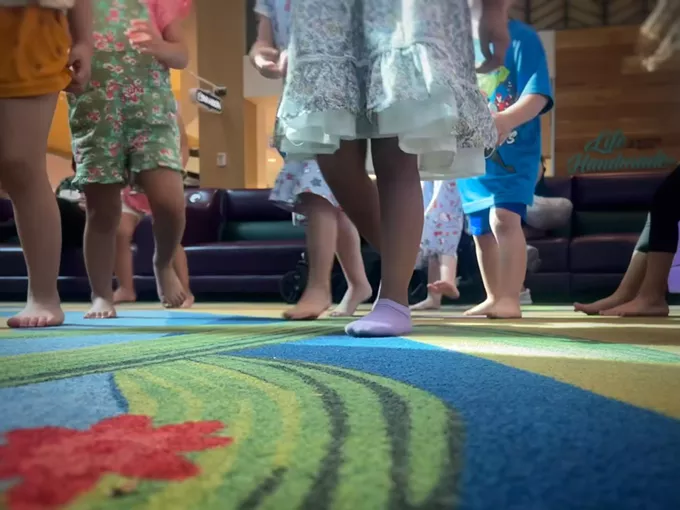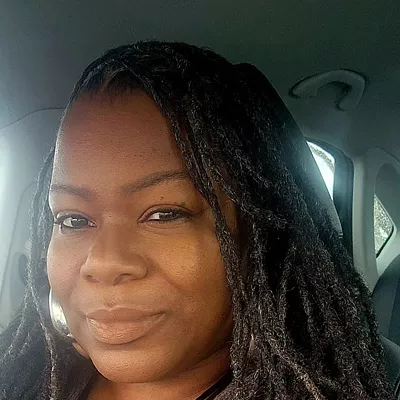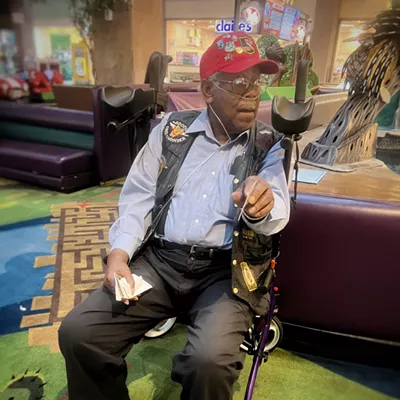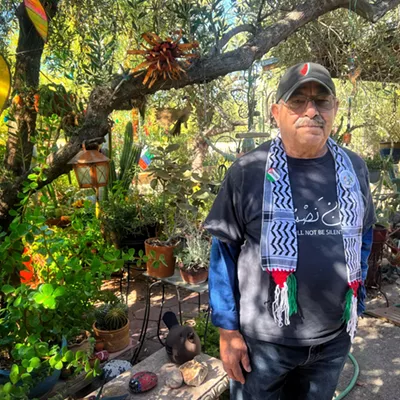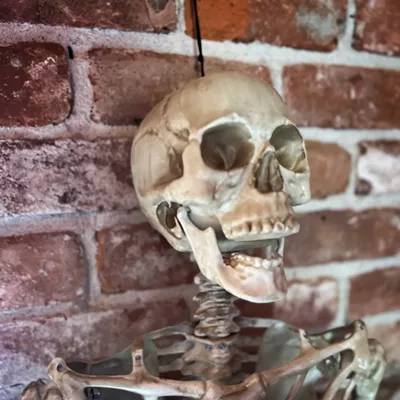It is a weekday afternoon and I’m escaping the heat with my daughter Rickie inside an indoor playground at Tucson’s Park Place mall. A hulking gent, maybe 40, with gigantic hands, lumpy arm scars, neo-Nazi prison etchings and gnarly face tats steps into the little fenced area with his toddler daughter, who wears a mini tutu and matching mouse ears.
I only say this because menace seems to seep from this dad, by way of design, cliché or no. It’s like he could kickstart something horrible and demeaning. His presence frightens a few seated mothers, of varying ethnicities, whose children are using the play equipment.
Soon his toddler daughter is carefully working a short slide. On her third go at it, a boy, blinded by excitement, hops onto the slide and crashes into the girl’s back. The girl shrieks, mouse ears tumble, tears and redness fill her face.
The dad hurries over, is literally brought to his knees, and tenderly embraces and consoles his daughter.
In a moment, the young Black boy, maybe 4 years old, and his mother, step over to apologize to the guy and his daughter. The dad looks to the mother, who shows genuine concern, and he mouths, “It’s OK, she’s OK. Thank you.” The boy holds out his hand and offers the girl a little toy truck. The girl slowly lifts it from his palm and begins rolling it on the soft rubber flooring. In a moment, the two kids hop back to the fold and continue playing together.
The dad shows a patience and kindness to the mother and her son, it is in his gestures, and in his eyes. I was expecting something else entirely. Maybe his invisible burdens masquerade as monsters, his racist tats regretful.
I watch another guy with short-cropped orange hair and a prolapsed belly button that seems to be leading his gut to its own independence out from under his “Trump Take America Back 2024” T-shirt. Just another cliché, right? This one born of the mook who tore this country open and slopped its bowels out. But now, it is 2016 on repeat. I feel pity for this guy somehow, though he appears happy but no less menacing. His shirt perhaps suggests awful unseen actions in his life — intolerance. His son plays with my daughter in a rousing game of tag, and he nods my way. What the hell? Maybe I’m just the judgmental fool.
In that mall moment, Mike Judge’s brilliant “Idiocracy” returns to me. How it shifted from apocalyptic allegory to prophecy, and, how we get to greet ourselves.
Feeling like I don’t belong anywhere, and inferior to those around me, comes easily, always has. Doesn’t matter who it is; the strung-out dealers on the street I’ll probe for a story, the kid order-taker at Taco Bell, the students and professors at universities where I’ve given talks on writing, and so on. Keeps me from many human interactions, even with friends. I’ve learned since grade school to quell so much fear with heroic inner narratives that trick me into temporary self-belief, pitiful but handy yarns of personal brilliance and other fictions. How difficult it is to just be. What burdens must those guys with the grim tattoos and preposterous T-shirts carry? Is there much more we should see than the gratuitous branding? Everyone can see the parts of themselves they don’t try to hide.
Children are a great equalizer; they can just be. I watch and learn how they level the playing field, how populated playgrounds become domains of tolerance and humanity. The children even seek eye contact with other parents, not their own, looking for approval on this common ground filled of wonder, where sympathies extend to any parent of small children. Now that is a trick.
How does one discover a little grace in the world? For me, now, it is in the children, or the music.
The days of Johnny Thunders juddering out tortured pop-blues riffs late at night, capturing hues of ferocity and beauty, my boyhood ears pressed to the speakers, navigating the suburban world around me — a broken junkie who became a hero. Later, an addled Miles Davis, juddering out riffs late at night, capturing those same hues of ferocity and beauty, alone at the speakers, teaching me how perfect imperfections transcend any genre. It’s in the emotional liberation, the torture, the joy. It is in the connection to the American Black south — the field hollers, the blues, soul, funk, jazz and rock ’n’ roll — a direct line to my heart that sparked imagination and empathy, curiosity and goosebumps.
To me, the world’s music is one giant, sprawling lullaby, a way to untangle, or at least soothe, the snarled mess of history. Drop a pin anywhere and the spirit remains the same. In my house lately, it swings from my wife’s lilting Pizmonim from pre-Zionist Jerusalem to the Fun Squad’s “Ninja Turtles Theme” to the acoustic-guitar frustrations I cluck out when the children are asleep.
There is also the lullaby of the playground and its children. There is no sense of the past, there is no sense of the future, it is just now. There are no sanctified assemblies to adhere to, no tropes or narratives of “democracy dying in darkness,” no bones of infants dead and buried under rubble, and, really, no reason to consider the world is about over. Not here right now. And in this now there is a certain kind of unalienable beauty, mixing with a scent of fresh-baked pretzels. It is an imagined world come to life.
Now I am alone on my patio. The world is no longer imagined, even with the 24-hour white-noise media cycle turned off. The monsoon rain is slanting down hard. I think I’ll go pick a fight with the giant saguaro who guards our house out front like a stupid sentry.

